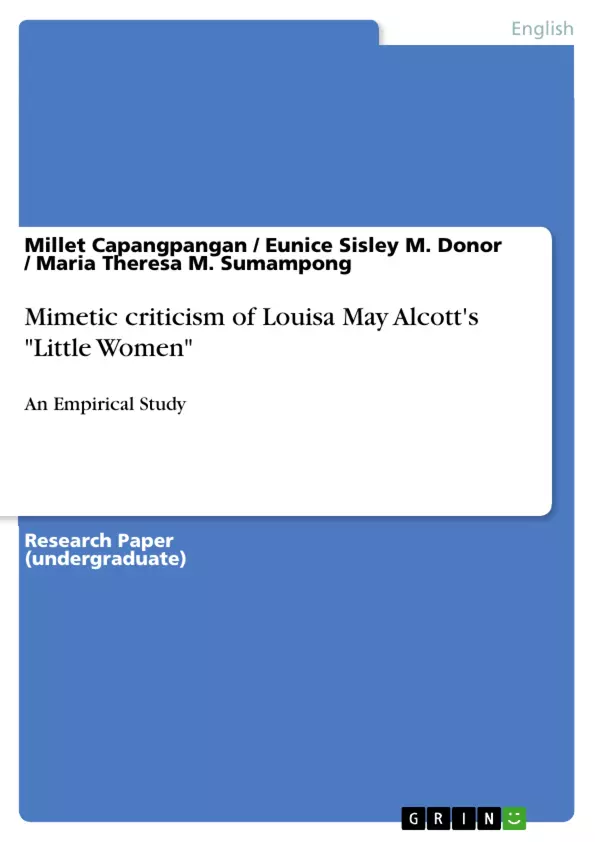This study gauges the mimetic criticism of the Louisa May Alcott’s “Little Women”.
An empirical study as basis for proposing alternative solution for fundamental problems. Mimetic theory and seven literary approaches were used to present the findings of the study. The findings of the study revealed that there is a relevant imitation of how society treat women from the past to the present times. Moreover, the use of the mimetic theory highlights the necessity of women awareness and expression. Thus, through the mimetic theory components which are the mimetic desires, scapegoat mechanism and revelations it was also found out that Alcott’s “Little Women” is an effective tool in having an in-depth analysis and understanding of the women’s humanitarian rights.
This premise is supported by the Mimetic theory of learning which states that learning by imitation, constitutes one of the most important forms of learning; Mimetic learning does not, however, just denote mere imitation or copying: Rather, it is a process by which the act of relating to other persons and worlds in a mimetic way leads to an enhancement of one’s own world view, action, and behavior.
Mimetic learning is productive; it is related to the body, and it establishes a connection between the individual and the world as well as other persons; it creates practical knowledge, which is what makes it constitutive of social, artistic, and practical action. Mimetic learning is cultural learning, and as such it is crucial to teaching and education. Recent research on primates has demonstrated that forms of mimetic learning that are observed in human beings are particularly prone to learn mimetically most especially in cultural studies.
Even Aristotle already viewed the ability to learn mimetically, as well as human delight in mimetic processes, as a specifically human gift. Moreover, mimetic actions are by no means only reproductions faithfully copying an example. Rather, in social practices which are performed mimetically, something entirely new is created thus it is a mere adaptation to pre-existing conditions, mimetic processes simultaneously create similarity to and difference from the situations or person they refer to. By “making themselves similar” to previously experienced situations and culturally formed worlds, subjects acquire the ability to find their way around a certain social field.
Table of Contents
- Chapter 1
- THE PROBLEM AND ITS SCOPE
- INTRODUCTION
- THE PROBLEM
- THE RESEARCH METHODOLOGY
- DEFINITION OF TERMS
- Chapter 2
- PRESENTATION AND INTERPRETATION OF DATA ANALYSIS
- Chapter 3
- SUMMARY OF FINDINGS, CONCLUSION, AND RECOMMENDATIONS
- SUMMARY OF FINDINGS
- CONCLUSION
- RECOMMENDATIONS
- Chapter 4
- THE OUTPUT OF THE STUDY
- LITTLE WOMEN
- Film Study Worksheet - For a Work of Fiction
Objectives and Key Themes
This study aims to analyze mimetic criticism of Louisa May Alcott's "Little Women" and utilize its findings to propose solutions for fundamental problems related to gender representation and societal expectations. The study employs mimetic theory and seven literary approaches to understand the text's portrayal of women's roles and experiences.
- Mimetic criticism as a framework for analyzing "Little Women"
- Gender representation and societal expectations for women
- The power of literature to influence social change
- The use of mimetic theory to interpret literary texts
- The significance of women's awareness and expression
Chapter Summaries
Chapter 1 presents the research problem, methodology, and theoretical background. It explores the rationale for analyzing "Little Women" through the lens of mimetic criticism, highlighting the importance of understanding gender stereotypes and the potential for literature to challenge these norms.
Chapter 2 delves into the data analysis, interpreting the findings through the framework of mimetic theory. It examines how "Little Women" reflects societal attitudes towards women and the challenges they face, while emphasizing the importance of women's voices and agency.
Chapter 3 summarizes the study's findings, drawing conclusions about the effectiveness of mimetic criticism in understanding the text's social commentary. It also proposes recommendations for further research and potential applications of the study's insights.
Keywords
The main keywords of this study include mimetic criticism, Louisa May Alcott's "Little Women," mimetic desires, scapegoat mechanism, revelations, gender stereotypes, societal expectations, women's rights, and literary analysis. The research focuses on applying mimetic theory to analyze the text and explore its social significance.
- Citar trabajo
- Millet Capangpangan (Autor), Eunice Sisley M. Donor (Autor), Maria Theresa M. Sumampong (Autor), 2022, Mimetic criticism of Louisa May Alcott's "Little Women", Múnich, GRIN Verlag, https://www.grin.com/document/1223416



